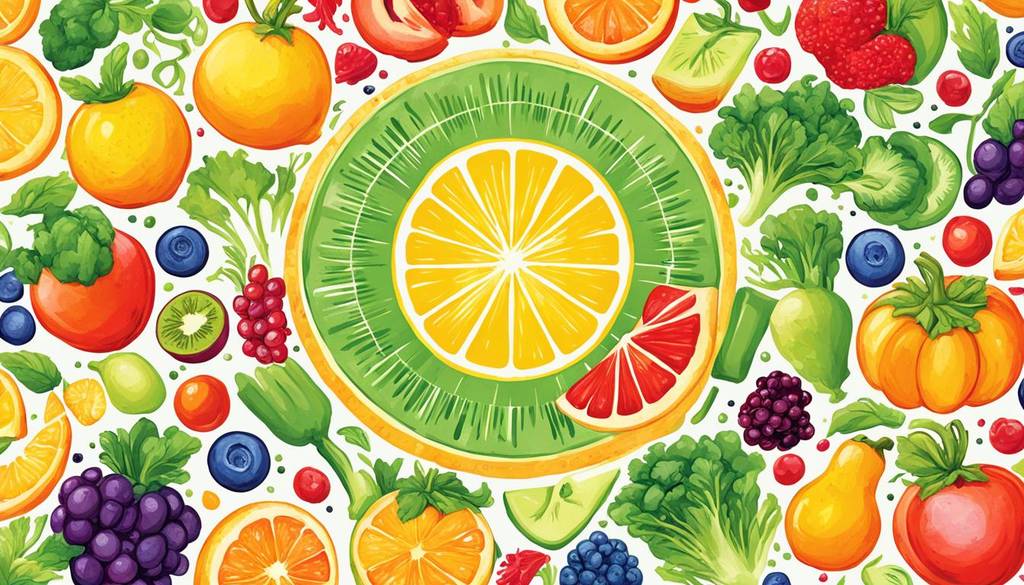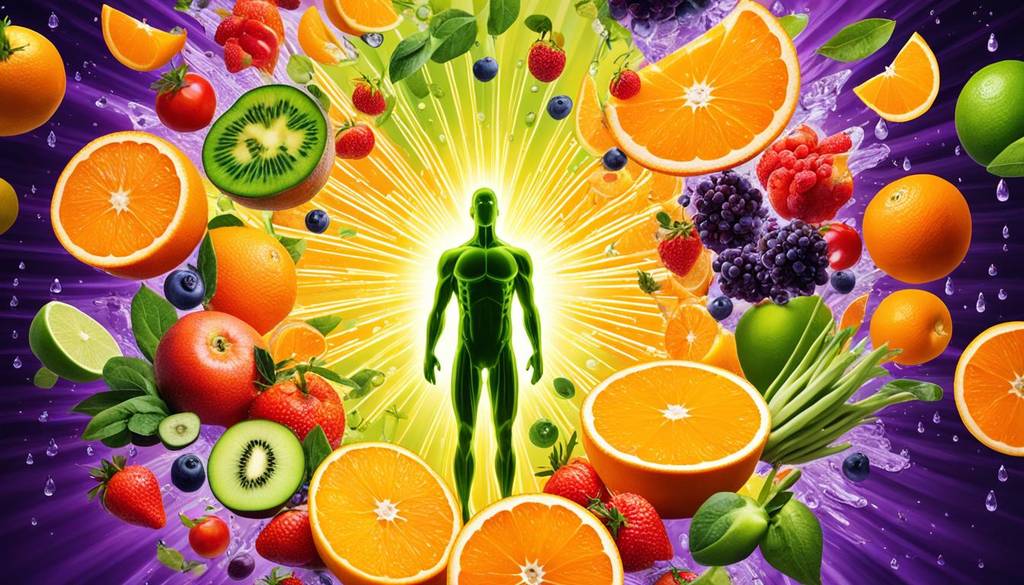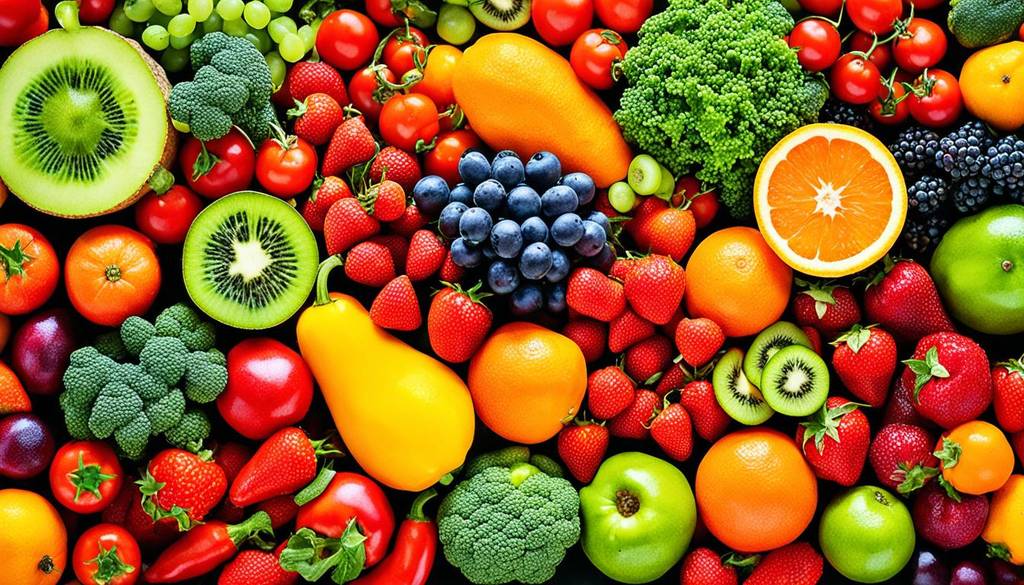Did you know that vitamin C is one of the most widely recognized and respected vitamins in the world? With its numerous health benefits, it’s no wonder that this powerful nutrient has gained such popularity. From supporting the immune system to promoting heart health and enhancing skin health, vitamin C plays a crucial role in overall wellness. In this article, we will explore the incredible benefits of vitamin C and how it can naturally boost your health.
Vitamin C is an essential nutrient that offers numerous health benefits. It is known for its antioxidant properties, its role in collagen production, its ability to enhance the immune system, and its importance in natural iron absorption. Additionally, vitamin C has been found to have positive effects on heart health, blood pressure control, gout prevention, and skincare. By incorporating vitamin C-rich foods into your diet and considering supplementation if needed, you can harness the power of this nutrient and boost your health naturally.
Key Takeaways:
- Vitamin C is a powerful nutrient with numerous health benefits.
- It plays a crucial role in supporting the immune system and promoting heart health.
- Vitamin C is essential for natural iron absorption and helps prevent anemia.
- It has been found to have positive effects on blood pressure control and gout prevention.
- Vitamin C is also important for maintaining healthy skin and promoting collagen production.
Vitamin C: Essential for Overall Wellness
Vitamin C is an essential nutrient that is required for the proper functioning of the body and overall wellness. It is water-soluble and cannot be produced by the body, so it must be obtained through dietary sources or supplements.
Vitamin C plays a crucial role in collagen production, which is important for healthy skin, tendons, and blood vessels. It also acts as an antioxidant, protecting against oxidative stress and promoting a strong immune system. Additionally, vitamin C helps in the absorption of iron and supports brain function.
By ensuring an adequate intake of vitamin C, you can optimize your overall wellness and maintain good health.
The Antioxidant Properties of Vitamin C
Vitamin C is a powerful antioxidant that helps protect the body against oxidative stress. Oxidative stress occurs when there is an imbalance between free radicals and antioxidants in the body, leading to cell damage and inflammation. Vitamin C neutralizes free radicals, reducing the risk of oxidative stress-related damage. This antioxidant action of vitamin C also helps mitigate the risk of chronic diseases such as heart disease, cancer, and neurodegenerative disorders.

Protection Against Oxidative Stress
Oxidative stress is a condition that arises when oxidative damage surpasses the body’s capacity to neutralize free radicals. Free radicals are highly reactive molecules that can cause damage to DNA, proteins, and other cellular components. This damage contributes to aging and the development of various diseases.
Vitamin C acts as an electron donor, effectively neutralizing free radicals and preventing oxidative stress. By doing so, it helps maintain the integrity of cells and tissues, promoting overall health and well-being.
Mitigating the Risk of Chronic Diseases
Vitamin C’s role as an antioxidant extends beyond protecting cells from oxidative stress. Its ability to neutralize free radicals also contributes to the prevention of chronic diseases.
Oxidative stress is known to play a significant role in the development of chronic diseases such as heart disease, cancer, and neurodegenerative disorders like Alzheimer’s and Parkinson’s disease. By reducing oxidative stress, vitamin C helps lower the risk of these conditions.
Research has shown that individuals with higher vitamin C levels have a decreased risk of heart disease, as vitamin C improves blood vessel function, reduces inflammation, and lowers blood pressure. Similarly, vitamin C’s antioxidant properties help protect against DNA damage that may lead to cancer development. Furthermore, studies have suggested that vitamin C may slow the progression of neurodegenerative disorders by reducing oxidative stress in the brain.
| Chronic Disease | Vitamin C’s Role |
|---|---|
| Heart Disease | Improves blood vessel function, reduces inflammation, and lowers blood pressure |
| Cancer | Protects against DNA damage and oxidative stress |
| Neurodegenerative Disorders | Reduces oxidative stress in the brain |
Vitamin C and Heart Health
Vitamin C plays a crucial role in maintaining heart health. It helps reduce the risk of heart disease by improving blood vessel function, lowering blood pressure, and reducing oxidative stress. Studies have shown that adequate levels of vitamin C can lower the risk of developing heart disease and decrease the severity of heart-related conditions. By including vitamin C in your diet, you can support your heart health and reduce the risk of cardiovascular diseases.

Controlling Blood Pressure Naturally
Vitamin C has been found to have a positive impact on blood pressure levels. Studies have shown that adequate intake of vitamin C can help regulate blood pressure and reduce the risk of hypertension. Vitamin C acts as an antioxidant, protecting the blood vessels from damage and improving their function. By incorporating vitamin C into your diet, you can naturally control blood pressure and maintain vascular health.
Studies on Hypertension and Vitamin C Intake
Several studies have explored the relationship between vitamin C intake and hypertension. A study published in the American Journal of Clinical Nutrition found that individuals with higher levels of vitamin C in their diet had lower blood pressure levels compared to those with lower intake. Another study published in the journal Hypertension showed that supplementation with vitamin C significantly reduced blood pressure in individuals with hypertension. These findings highlight the important role of vitamin C in maintaining healthy blood pressure levels.
The Impact of Antioxidants on Vascular Health
As a potent antioxidant, vitamin C helps protect the blood vessels from oxidative damage. Oxidative stress can lead to inflammation and dysfunction of the vascular system, which can contribute to the development of hypertension. Vitamin C neutralizes free radicals and reduces oxidative stress, promoting the health and function of blood vessels. By incorporating antioxidants like vitamin C into your diet, you can support vascular health and reduce the risk of hypertension.

| Vitamin C-Rich Foods | Vitamin C Content (per 100g) |
|---|---|
| Guava | 228.3mg |
| Red bell peppers | 128mg |
| Kiwi | 93mg |
| Oranges | 53.2mg |
| Strawberries | 59mg |
Vitamin C’s Role in Immunity-Boosting
Vitamin C is well-known for its role in supporting the immune system. It helps stimulate the production of white blood cells, which are essential for fighting off infections and diseases. Vitamin C also strengthens the skin’s defense system and promotes wound healing. By ensuring an adequate intake of vitamin C, you can boost your immune system and enhance your body’s ability to fight off illnesses.

Natural Iron Absorption With Vitamin C
Vitamin C plays a crucial role in enhancing the absorption of iron, especially from plant-based sources. Iron is an essential nutrient that is needed for the production of red blood cells and oxygen transport. Adequate iron levels are important for preventing anemia and maintaining overall health.
When it comes to iron absorption, plant-based sources can be challenging as they contain non-heme iron, which is not as easily absorbed by the body compared to heme iron found in animal products. However, consuming vitamin C-rich foods alongside plant-based iron sources can significantly enhance iron absorption and promote better iron balance in the body.
How does vitamin C enhance iron absorption?
Vitamin C helps convert poorly absorbed iron into a more soluble form that the body can readily absorb. It does this by converting ferric iron (Fe3+) into ferrous iron (Fe2+), which is better absorbed in the intestines. This powerful interaction between vitamin C and iron not only improves iron absorption but also plays a vital role in preventing iron deficiency anemia.
To maximize the benefits of vitamin C in enhancing iron absorption, it is recommended to consume vitamin C-rich foods alongside plant-based iron sources. Some examples of vitamin C-rich foods include citrus fruits, kiwi, strawberries, papaya, bell peppers, and broccoli.

| Food | Vitamin C Content (mg) | Plant-Based Iron Content (mg) |
|---|---|---|
| Oranges | 70 | 0.1 |
| Strawberries | 59 | 0.8 |
| Bell Peppers | 95 | 0.3 |
| Broccoli | 81 | 1 |
| Spinach | 8.4 | 3.6 |
By including vitamin C-rich foods in your meals, you can optimize iron absorption from plant-based sources and prevent iron deficiency anemia. However, it is important to note that excessive iron absorption can be harmful, especially for individuals with conditions such as hemochromatosis. Therefore, it is recommended to consult with a healthcare professional and determine the appropriate intake of iron and vitamin C based on your individual needs and health status.
Benefits of Vitamin C in Preventing Gout
Vitamin C has been found to have preventive effects against gout, a form of arthritis that is caused by the buildup of uric acid crystals in the joints. Adequate vitamin C intake helps reduce the levels of uric acid in the blood, lowering the risk of developing gout and reducing the frequency of gout attacks. By incorporating vitamin C into your diet, you can help prevent the onset of gout and manage its symptoms.

Gout is a painful condition that affects millions of people worldwide, and it is known to be more common among men and individuals with a family history of the disease. It often causes sudden and severe attacks of joint pain, swelling, and inflammation. The primary cause of gout is the elevated levels of uric acid in the blood, which can lead to the formation of sharp crystals in the joints.
Research has shown that vitamin C can help lower the levels of uric acid in the blood, thereby reducing the risk of developing gout. A study published in the Archives of Internal Medicine found that individuals who consumed higher levels of vitamin C had a lower risk of gout. Another study published in Arthritis & Rheumatism showed that vitamin C supplementation decreased the frequency of gout attacks in patients with established gout.
Aside from its uric acid-lowering properties, vitamin C also has anti-inflammatory effects, which can help reduce the pain and swelling associated with gout attacks. It also acts as an antioxidant, neutralizing free radicals and reducing inflammation in the joints.
Incorporating vitamin C-rich foods into your diet is an excellent way to harness the preventive benefits of this nutrient. Citrus fruits such as oranges, lemons, and grapefruits are well-known sources of vitamin C. Other foods rich in vitamin C include strawberries, bell peppers, kiwi, and broccoli.
In addition to dietary sources, vitamin C supplements can also be beneficial in preventing gout. However, it is important to consult with a healthcare professional before starting any new supplements to determine the appropriate dosage for your specific needs.
In conclusion, vitamin C plays a significant role in preventing gout by reducing uric acid levels and providing anti-inflammatory effects. By incorporating vitamin C-rich foods into your diet or considering supplementation, you can help lower the risk of developing gout and manage its symptoms effectively.
Vitamin C in a Diet: Foods Rich in This Vital Nutrient
Vitamin C is an essential nutrient that can be obtained through a variety of dietary sources. Incorporating foods rich in vitamin C into your diet is crucial for ensuring an adequate intake of this vital nutrient.
Citrus Fruits and Berries
Citrus fruits, such as oranges and lemons, are well-known for their high vitamin C content. These fruits not only provide a refreshing burst of flavor but also offer a significant amount of this essential nutrient. Berries, such as strawberries and raspberries, are also excellent sources of vitamin C. Whether enjoyed fresh or added to smoothies, salads, or desserts, citrus fruits and berries are delicious ways to boost your vitamin C intake.
Vegetables High in Vitamin C: Peppers and Leafy Greens
Peppers and leafy greens are another category of foods that are rich in vitamin C. Bell peppers, both red and green, are particularly high in vitamin C. Whether consumed raw or cooked, peppers can be a versatile addition to your meals. Leafy greens, such as kale and spinach, are not only packed with essential vitamins and minerals but also offer a significant amount of vitamin C. Including these vegetables in your diet is a great way to ensure you’re getting an adequate amount of this vital nutrient.
By incorporating citrus fruits, berries, peppers, and leafy greens into your diet, you can boost your vitamin C intake and support your overall health and well-being.

Debunking Myths: Unproven Claims of Vitamin C
While vitamin C has numerous proven benefits, there are also several unproven claims surrounding its effects. It is important to separate fact from fiction when it comes to vitamin C. This section will debunk common myths and misconceptions surrounding the nutrient, providing evidence-based information.
“Vitamin C can cure the common cold.” This is one of the most commonly perpetuated myths about vitamin C. While vitamin C can support immune function, it cannot cure a cold once it has already developed. However, a regular intake of vitamin C may help reduce the duration and severity of symptoms.
“High-dose vitamin C can prevent or cure cancer.” There have been claims that high-dose vitamin C can prevent or even cure cancer. However, there is insufficient scientific evidence to support these claims. Vitamin C may have a role in supporting overall health but should not be considered a standalone treatment for cancer.
“Vitamin C can lighten or whiten the skin.” Some beauty products claim that vitamin C can lighten or whiten the skin. While vitamin C does have skin benefits, such as promoting collagen production and protecting against free radicals, it does not have the ability to change the natural color of your skin.
“Taking large amounts of vitamin C is always beneficial.” It is important to note that excessive intake of vitamin C can have negative effects on the body. High doses can cause digestive issues, diarrhea, and increased risk of kidney stones. It is recommended to stick to the recommended daily intake and consult with a healthcare professional before taking high-dose supplements.
By debunking these unproven claims surrounding vitamin C, we can separate fact from fiction and ensure that we make informed decisions about our health. While vitamin C has numerous benefits, it is important to approach it with realistic expectations and consult with healthcare professionals when needed.
The Role of Vitamin C in Skincare
Vitamin C plays an important role in skincare, benefiting both topical applications and dietary intake. Its powerful antioxidant properties help protect the skin from free radical damage, reduce signs of aging, and promote collagen production.
Topical Applications and Benefits for the Skin
Topical applications of vitamin C, such as serums and creams, offer numerous benefits for the skin. The antioxidant action of vitamin C helps neutralize free radicals, which are unstable molecules that can cause damage to skin cells. By reducing oxidative stress, vitamin C helps prevent premature aging, including the formation of wrinkles, fine lines, and age spots. It also promotes collagen synthesis, a protein that provides structure and elasticity to the skin, promoting a youthful and radiant complexion.
Additionally, topical vitamin C can help brighten the skin, reduce hyperpigmentation, and even out the skin tone. It assists in reducing inflammation, soothing redness, and promoting faster healing of blemishes and acne scars. The skin’s natural barrier function is also enhanced by vitamin C, protecting it from environmental pollutants and UV radiation.
To maximize the benefits of topical vitamin C, it is important to choose products with stable and highly concentrated forms of vitamin C, such as L-ascorbic acid. These formulations ensure optimal absorption and efficacy.

Connection Between Dietary Vitamin C and Skin Health
In addition to topical applications, dietary intake of vitamin C is essential for maintaining overall skin health. Consuming foods rich in vitamin C helps provide the nutrients necessary for collagen synthesis and skin regeneration from within, resulting in a healthy and youthful complexion.
Vitamin C is abundantly found in fruits and vegetables, particularly citrus fruits like oranges and strawberries, as well as bell peppers and leafy greens like broccoli and kale. These vitamin C-rich foods also contain other beneficial nutrients and antioxidants that contribute to skin health.
It is important to note that while a balanced diet can provide a significant amount of vitamin C, supplementing with vitamin C can be beneficial for individuals with specific skin concerns or those who have difficulty meeting their daily requirements through diet alone. However, it is always recommended to consult with a dermatologist or healthcare professional before starting any new skincare or supplement regimen.
Understanding Vitamin C Supplements and Dosages
Vitamin C supplements can be a convenient way to ensure an adequate intake of this essential nutrient. While it is always best to obtain nutrients from whole foods, supplements can be beneficial for individuals who have difficulty meeting their vitamin C needs through diet alone.
When considering vitamin C supplementation, it is important to understand the recommended daily intake for men and women. The recommended daily intake (RDI) of vitamin C for most adults is 75-90 milligrams per day for women and 90-120 milligrams per day for men. However, certain individuals may require higher doses, such as pregnant or breastfeeding women, individuals who smoke, and those with specific medical conditions.
Excessive intake of vitamin C can have potential side effects. While it is generally considered safe, extremely high doses can cause digestive issues such as diarrhea, nausea, and stomach cramps. Prolonged excessive intake of vitamin C may also increase the risk of kidney stones. It is important to follow the recommended dosages and consult with a healthcare professional before significantly increasing your vitamin C intake through supplementation.
Recommended Daily Intake for Men and Women
The recommended daily intake (RDI) of vitamin C varies for men and women, and it is important to follow the appropriate dosage guidelines. The table below provides an overview of the recommended daily intake of vitamin C for different age groups and genders:
| Age Group | Women (RDI in milligrams per day) | Men (RDI in milligrams per day) |
|---|---|---|
| 19-30 years | 75 mg | 90 mg |
| 31-50 years | 75 mg | 90 mg |
| 51-70 years | 75 mg | 90 mg |
| 71+ years | 75 mg | 90 mg |
Potential Side Effects of Excess Vitamin C
While vitamin C is generally safe, excessive intake can potentially lead to side effects. It is important to avoid megadoses of vitamin C, as this can cause digestive issues such as diarrhea, nausea, and stomach cramps. Prolonged excessive intake of vitamin C may also increase the risk of kidney stones, especially in individuals with a history of kidney problems or kidney stones.
It is always recommended to consult with a healthcare professional before significantly increasing your vitamin C intake through supplementation. They can help determine the appropriate dosage based on your individual needs and address any concerns or potential interactions with other medications or supplements you may be taking.
Addressing Vitamin C Deficiency
Vitamin C deficiency, although rare in developed countries, can occur in certain situations such as a limited diet or smoking. Lack of adequate vitamin C can lead to various health issues. It is crucial to be aware of the signs and symptoms of vitamin C deficiency and take the necessary steps to address and prevent it.
Signs and symptoms of vitamin C deficiency may include:
- Fatigue: Feeling constantly tired and lacking energy.
- Weakness: Experiencing muscle weakness and difficulty performing daily activities.
- Bleeding Gums: Easy bruising and bleeding of the gums.
- Skin Changes: Dryness, roughness, and the formation of small, raised bumps.
- Poor Wound Healing: Delayed healing of cuts and bruises.
- Joint and Muscle Pain: Achy joints and muscle discomfort.
To address and prevent vitamin C deficiency, it is important to incorporate vitamin C-rich foods into your diet. Citrus fruits such as oranges, lemons, and grapefruits are excellent sources of vitamin C. Other fruits like strawberries, kiwi, and papaya also provide a significant amount of this vital nutrient. Vegetables such as bell peppers, broccoli, and spinach are additional sources of vitamin C. Including these foods in your meals can help increase your vitamin C intake.
In cases where dietary changes alone are not sufficient to overcome the deficiency, vitamin C supplementation may be considered. Working with a healthcare professional is recommended to determine the appropriate dosage and duration of supplementation, as excessive intake of vitamin C can have potential side effects.
Table: Vitamin C-Rich Foods
| Foods | Vitamin C Content per Serving |
|---|---|
| Oranges | 70 mg |
| Strawberries | 98 mg |
| Bell Peppers | 95 mg |
| Broccoli | 81 mg |
| Kiwi | 64 mg |
| Spinach | 28 mg |
By addressing vitamin C deficiency through dietary modifications and, if necessary, supplementation, individuals can ensure they meet the recommended daily intake of this essential nutrient and maintain optimal health.
Conclusion
In conclusion, vitamin C is a powerful and essential nutrient that offers a wide range of health benefits. Whether you want to boost your immune system, promote heart health, or enhance your skin’s appearance, incorporating vitamin C into your daily routine can make a significant difference in your overall wellness.
By including vitamin C-rich foods in your diet, such as citrus fruits, berries, peppers, and leafy greens, you can naturally increase your intake of this vital nutrient. Additionally, considering supplementation may be beneficial if you have specific health concerns or dietary limitations.
However, it is important to note that before making any changes to your diet or starting any supplements, it is always best to consult with a healthcare professional. They can provide personalized advice based on your individual needs and help you determine the right approach to harnessing the power of vitamin C for your health.
FAQ
What are the benefits of vitamin C?
How does vitamin C protect against oxidative stress?
What is the impact of vitamin C on heart health?
Can vitamin C help control blood pressure?
How does vitamin C enhance the immune system?
What is the role of vitamin C in natural iron absorption?
How does vitamin C prevent gout?
What are the best food sources of vitamin C?
What are some common myths about vitamin C?
What is the role of vitamin C in skincare?
How should I take vitamin C supplements?
What are the symptoms of vitamin C deficiency?
Source Links
- https://www.healthline.com/nutrition/vitamin-c-benefits
- https://www.hsph.harvard.edu/nutritionsource/vitamin-c/
- https://www.mayoclinic.org/drugs-supplements-vitamin-c/art-20363932


